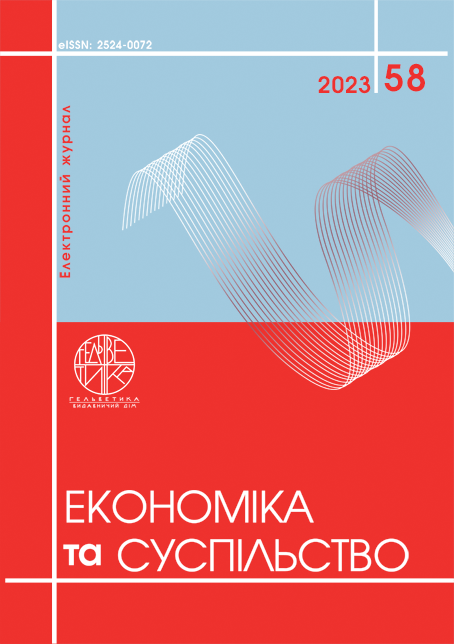ОСОБЛИВОСТІ РОЗВИТКУ ІКТ СФЕРИ У СХІДНІЙ ЄВРОПІ
Анотація
У статті досліджено та представлено аналіз інформаційно-телекомунікаційного сектору на прикладах країн регіону Східної Європи. Досліджено показники розвитку ІТК регіону у цілому та окремих країн, зокрема, Азербайджану, Грузії та Молдови. Досліджено, перш за все, динаміку показнику доданої вартості сектору у ВВП, оскільки його досягнення для ІКТ сфери рівня 5% вважається свідченням рівня розвитку сектору у країнах ЦСЄ. Означено позитивну динаміку показника робочої сили для інформаційно-телекомунікаційного сектору протягом періоду 2016-2021 років. Досліджено динаміку показнику освітньої складової. Основними показниками у цій категорії обрано порівняння кількості студентів, випускників за спеціальностями ІТК направленості. Для розуміння ефективності ІТК сектору по країнах було проаналізовано показники експорту ІТК. Для більш детального ознайомлення зі складовими сектору та його функціонуванням досліджено цей показник окремо для технологічного сегмента. За результатами узагальнено, що для регіону Східної Європи відбувається переорієнтація експорту за сегментами в секторі ІТК від технологічного до телекомунікаційного напрямку. Зазначено, що ІТК сектор Молдови і Грузії у цілому демонструє слідування загальній стратегії розвитку ІКТ сфери у країнах ЦСЄ, у той час, як Азербайджан має певну стагнацію та відхилення.
Посилання
Abasova, S. Analysis and assessment of ICT innovations impact on competitiveness of foreign economic relations: Azerbaijan’s experience. Technology Audit and Production Reserves. 2022. Vol. 5, № 4(67). Р. 29–36. DOI: https://doi.org/10.15587/2706-5448.2022.268042
Huseynova, A., Mazanova, O. The Leading Role of Digital Technologies in the Development of the Smart City Concept in Azerbaijan (2022070050). 2023. Preprints. DOI: https://doi.org/10.20944/preprints202207.0050.v2
Bickauske, D., Simanaviciene, Z., Samorodov, B., Kromalcas, S. Digital transformation and increasing Moldova industry SWOT analysis. Financial and Credit Systems: Prospects for Development. 2022. № 2(5). Р. 56–67. DOI: https://doi.org/10.26565/2786-4995-2022-2-06
Arendt, Ł. (2015). The Digital Economy, ICT and Economic Growth in the CEE Countries. Olsztyn Economic Journal. 2015. № 10(3). Р. 247–262. DOI: https://doi.org/10.31648/oej.3150
Lengyel, B. The Hungarian ICT Sector: A Comparative CEE Perspective with Special Emphasis on Structural Change. In P. J. J. Welfens (Ed.), Clusters in Automotive and Information & Communication Technology: Innovation, Multinationalization and Networking Dynamics. Springer, 2012. Р. 59–85. DOI: https://doi.org/10.1007/978-3-642-25816-9_2
Future of IT Report 2023. Emerging Europe. URL: https://646395.fs1.hubspotusercontent-na1.net/hubfs/646395/Reports%202023/Emerging%20Europe%20Future%20of%20IT%20Report%202023.pdf
The Future of IT: Landscape Report 2022. Emerging Europe. URL: https://emergingeurope.myshopify.com/products/the-future-of-it-landscape-report-2022-free
Information Society. The State Statistical Committee of the Republic of Azerbaijan. URL: https://www.stat.gov.az/source/information_society/?lang=en
Information and Communication Technologies (ICTs) sector in Georgia. April 2023. URL: https://pmcresearch.org/publications_file/2120642a909c265ad.pdf
Economic statistics. Biroul National de Statistica al Republicii Moldova. URL: https://statbank.statistica.md/PxWeb/pxweb/en/40%20Statistica%20economica/?rxid=b2ff27d7-0b96-43c9-934b-42e1a2a9a774
Social statistics. Biroul National de Statistica al Republicii Moldova. URL: https://statbank.statistica.md/PxWeb/pxweb/en/30%20Statistica%20sociala/?rxid=b2ff27d7-0b96-43c9-934b-42e1a2a9a774
Abasova, S. (2022). Analysis and assessment of ICT innovations impact on competitiveness of foreign economic relations: Azerbaijan’s experience. Technology Audit and Production Reserves, vol. 5, no. 4(67), 29–36. DOI: https://doi.org/10.15587/2706-5448.2022.268042
Huseynova, A., & Mazanova, O. (2023). The Leading Role of Digital Technologies in the Development of the Smart City Concept in Azerbaijan (2022070050). Preprints. DOI: https://doi.org/10.20944/preprints202207.0050.v2
Bickauske, D., Simanaviciene, Z., Samorodov, B., & Kromalcas, S. (2022). Digital transformation and increasing Moldova industry swot analysis. Financial and Credit Systems: Prospects for Development, 2(5), 56–67. DOI: https://doi.org/10.26565/2786-4995-2022-2-06
Arendt, Ł. (2015). The Digital Economy, ICT and Economic Growth in the CEE Countries. Olsztyn Economic Journal, 10 (3). 247–262. DOI: https://doi.org/10.31648/oej.3150
Lengyel, B. (2012). The Hungarian ICT Sector: A Comparative CEE Perspective with Special Emphasis on Structural Change. In P. J. J. Welfens (Ed.), Clusters in Automotive and Information & Communication Technology: Innovation, Multinationalization and Networking Dynamics. Springer. DOI: https://doi.org/10.1007/978-3-642-25816-9_2
Emerging Europe (2023). Future of IT Report 2023. Available at: https://646395.fs1.hubspotusercontent-na1.net/hubfs/646395/Reports%202023/Emerging%20Europe%20Future%20of%20IT%20Report%202023.pdf
Emerging Europe (2023). The Future of IT: Landscape Report 2022. Available at: https://emergingeurope.myshopify.com/products/the-future-of-it-landscape-report-2022-free
The State Statistical Committee of the Republic of Azerbaijan (2023). Information Society. Available at: https://www.stat.gov.az/source/information_society/?lang=en
Pmcresearch (2023). Information and Communication Technologies (ICTs) sector in Georgia. Available at: https://pmcresearch.org/publications_file/2120642a909c265ad.pdf
Biroul National de Statistica al Republicii Moldova (2023). Economic statistics. Available at: https://statbank.statistica.md/PxWeb/pxweb/en/40%20Statistica%20economica/?rxid=b2ff27d7-0b96-43c9-934b-42e1a2a9a774
Biroul National de Statistica al Republicii Moldova (2023). Social statistics. Available at: https://statbank.statistica.md/PxWeb/pxweb/en/30%20Statistica%20sociala/?rxid=b2ff27d7-0b96-43c9-934b-42e1a2a9a774

Ця робота ліцензується відповідно до Creative Commons Attribution 4.0 International License.


